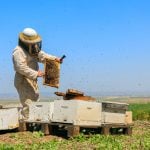McDonald’s has announced a wide-ranging policy to reduce the use of antibiotics in its beef supply chain.
Working with its top 10 national suppliers, the corporation wants to assess the current level of medically important antibiotics used in food-producing animals. In 2020, it plans to set targets to reduce these products and will report the results in 2022.
“Our overall approach to responsible use of antibiotics focuses on refining, reducing and ultimately replacing antibiotics with long-term solutions to prevent diseases and protect animal health and welfare. With this in mind, we remain committed to treating animals when needed,” said a company statement.
Read Also

Manitoba horticulture hits the books
The 2025 Horticulture School in Brandon covered tools to extend Manitoba’s vegetable and fruit growing season, horticulture crop agronomy and new research like peat sustainability
Canada, Australia, Brazil, France, Germany, Ireland, New Zealand, Poland, the United Kingdom and the United States are involved.
McDonald’s announced a similar project for chicken in 2017 and is planning a program for pork suppliers.
As part of this initiative, McDonald’s has joined the U.S. Center for Disease Control and Prevention Antimicrobial Resistance Challenge. It is a year-long campaign to accelerate the fight against antimicrobial resistance throughout the world. The World Health Organization has declared antimicrobial resistance as one of the greatest threats to health and food security.
McDonald’s was a foundation member of the Canadian Round Table for Sustainable Beef. It has committed to serving as much beef as possible from sustainable sources and among the certification requirements is responsible antibiotic use.
In an email statement, the roundtable board commended McDonald’s for its stance because it is in line with sustainability goals and responsible antimicrobial use.
Many companies have made progress in the chicken supply chain so beef is the next frontier for responsible use of antibiotics in food production, said As You Sow spokesperson Christy Spees based in California.
“They had committed to us and other shareholder advocates after our last year of engagement that they would come out with a policy on beef by the end of this year,” she said.
This will have a huge impact on the beef industry globally, she added.
Canada and the United States regulate antibiotic use in food animals. In Canada producers must get prescriptions for medically important antibiotics.
Corporations will lead the way on these initiatives rather than government.
“For things like food safety and environmental regulations we are not seeing any progress from the FDA (Food and Drug Administration) or USDA (U.S. Department of Agriculture). We think that corporations have the biggest opportunity to make an impact on what the industry is doing,” she said.
This group is concerned about the use of antibiotics for growth promotion and prevention of disease.
“The over-use of antibiotics in food animals contributes to antibiotic resistance regardless of whether antibiotics remain in the final product. Our ultimate concern is with factory farming. We want to see food produced in a more sustainable way that has lower impacts on the environment and public health. One of the many negative consequences of factory farming is contribution to antibiotic resistance,” she said.















